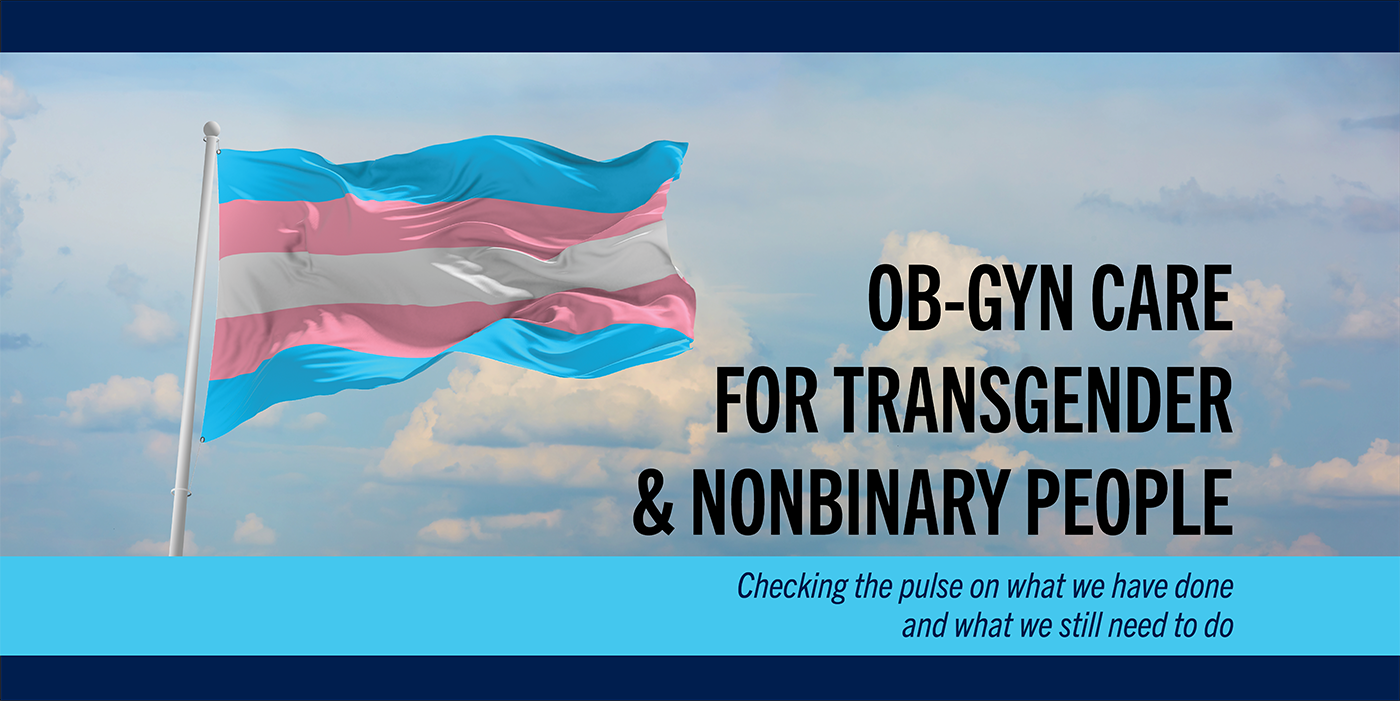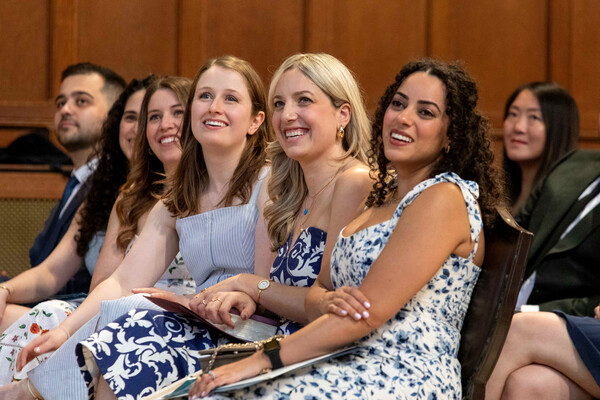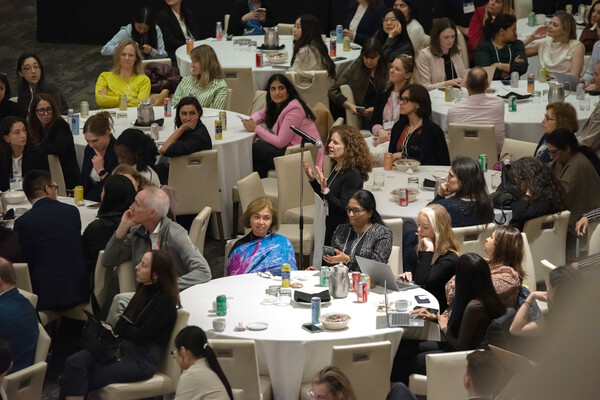Ob-gyn care for transgender and nonbinary people in the GTA

The International Transgender Day of Visibility took place on March 31, an annual opportunity to celebrate and recognize the strength, achievements, and courage of transgender and nonbinary people around the world.
As obstetrician-gynaecologists, we are committed to a standard of excellence in providing care to all our patients. That said, we also know that gender-diverse people have faced—and continue to face—myriad challenges and frustrations when navigating the medical system and seeking out care. These interactions can lead to negative health outcomes, and at their worst, they can cause grievous harm.
Obstetricians and gynaecologists provide vitally important sexual and reproductive healthcare to people who express a range of gender identities. We therefore must be ever mindful of our responsibility to serve our gender-diverse patients in an inclusive and supportive way, centring their experience, listening actively, and ensuring that we are responsive to their unique needs.
More than 300 obstetrician-gynaecologists in the Greater Toronto Area are faculty members in our department, the largest in Canada. These physicians provide clinical care to tens of thousands of patients every year, including a substantial number of gender-diverse people. Our faculty also train the next generations of ob-gyns and subspecialists, who will go on to work in Toronto, across Canada, and around the world.
While we acknowledge that there is still a great deal of work ahead of us in addressing the systemic healthcare inequities faced by trans and nonbinary people, we also wish to recognize the work being done by members of our Department across the GTA.
- Language matters. While our specialty has historically been associated with cisgender women, who continue to make up the majority of our patients, we know that the words we choose have an impact, signalling to gender-diverse patients that they belong in our spaces. At hospitals and clinics across the GTA, we have found ways to ensure that our nomenclature, signage, and terminology include trans and nonbinary people as well as cisgender women. Members of our faculty have also advocated with various hospital administrations to push for changes to administrative systems, electronic medical records, and other documents to more accurately reflect gender identity while removing barriers in computer systems that reflect outdated binary structures.
- Several sites have prioritized educating every individual, from physicians to nurses to administrative staff, to ensure they are familiar with gender-diverse and 2SLGBTQ identities and are able to effectively communicate in a sensitive way. This includes addressing individuals by their preferred names and using correct pronouns. These sites have led the way in creating more inclusive environments, and many other clinics and hospitals are now following their lead.
- Gender-affirming care at ob-gyn clinics throughout the GTA continues to expand, with more and more physicians specializing in the care of trans and nonbinary patients. This includes gender-affirming surgery, obstetrical care for gender-diverse pregnant people, as well as the full spectrum of gynaecologic care. Examples of hospital sites that have developed a particular focus include:
- Michael Garron Hospital, where Dr. Helena Frecker has run a clinic focused on gender-diverse care which has included hysterectomy for trans men, post-op vaginoplasty care for trans women, and general gynaecologic care oriented to the needs of nonbinary and trans folks.
- St. Michael’s Hospital, where clinics led by Dr. Rajiv Shah, Dr. Sari Kives, Dr. Andrea Simpson, Dr. Deborah Robertson, and Dr. Marie Christakis provide general obstetrical and gynaecologic care as well as gender-affirming surgery to a large referral base of trans patients.
- Women’s College Hospital is also an important centre for transition-related surgery. Our faculty work collaboratively in a clinic led by Dr. Yonah Krakowsky of the Department of Surgery which provides procedures including chest masculinization, breast augmentation, and vaginoplasty.
- Trans and nonbinary youth are a particularly vulnerable population, and the Hospital for Sick Children runs an interdisciplinary Transgender Youth Clinic providing information, options, and care to young people of diverse gender identities. Our division of paediatric and adolescent gynaecology, led by Dr. Lisa Allen, provides counselling to young people who are considering fertility preservation prior to transition. Dr. Sari Kives’s practice at SickKids is also focused on providing care to trans and nonbinary children and adolescents.
- As more trans and nonbinary people pursue fertility care, our subspecialists in reproductive endocrinology and infertility have worked to adapt their services in response to the needs of gender-diverse patients who wish to become pregnant. REI physicians also play an important role in the preservation of fertility in individuals prior to transition. Mount Sinai Fertility, led by Dr. Kimberly Liu, has worked to ensure that their website provides sensitive and thorough information for trans people pursuing fertility treatment. Private fertility clinics have also prioritized inclusive care for trans people. Dr. Karen Glass of CReATe Fertility has worked to draw attention to the needs of this population, and she was featured in the documentary My Trans Journey counselling a trans woman on sperm cryopreservation.
- Alongside clinical work, many of our faculty members are involved in important advocacy work:
- Dr. Frecker is collaborating with midwifery colleagues from Michael Garron Hospital to set up a satellite clinic at Sherbourne Health, providing pregnancy, birth, and lactation care for 2SLGBTQ and gender-diverse clients. She is also pursuing grant funding to improve gender inclusivity in her unit at MGH.
- In response to a significant wait list for surgical referrals and lack of access to surgical services in publicly funded hospitals, Women’s College Hospital has partnered with Sherbourne Health, Rainbow Health Ontario and CAMH, along with a group of committed community members, to form the Trans Health Expansion (THEx) partnership.
The efforts made at our clinical sites have a direct impact on the experiences of trans and nonbinary patients. At the same time, these spaces are also where we educate the next generations of ob-gyns. We must ensure that our trainees are thoroughly prepared to provide gender-affirming care to their patients, as they join the long-term effort to continuously improve healthcare for gender-diverse people.
Beginning in first year of the MD program and continuing through each year of the program, undergraduate medical students learn about basic science as it applies to gender, the importance of gender-affirming interventions (both medical and surgical), the unique needs of trans and nonbinary people when performing pelvic exams and cervical screening, and general knowledge about gender diverse and 2SLGBTQ identities and communities.
Our ob-gyn residents and fellows work alongside our faculty members in the range of clinics and programs described above. In addition, academic half days are focused on unique challenges that arise in the care of trans and nonbinary people. These seminars are delivered by faculty with recognized expertise and experience in this field as well as through peer-to-peer teaching.
Our faculty professional development programs provide additional opportunities for clinicians in our department to deepen and expand their ability to provide gender-inclusive care. These include monthly rounds, hospital-based modules, clinical guidelines, webinars, tutor guides, presentations at national meetings including the Society of Obstetricians and Gynaecologists of Canada, media appearances, and our annual Faculty Professional Development Day. In addition, our department is collaborating with Women’s College Hospital on a planned conference this fall entitled “Words Matter: Gender-Inclusive Language in Medicine,” which will include colleagues from the Wilson Centre, Sherbourne Health, and representation from across TAHSN hospitals.
•••
We will continue to centre the experiences of trans and nonbinary people as we determine how to further improve gender-affirming obstetrical and gynaecologic care for members of this community. This is an important facet of our work, and we welcome continued engagement with our patients to ensure that progress always moves forward.
All of our patients deserve the best care possible. Our work therefore continues.
Dr. Richard Pittini (he/him)
Professor and Vice Chair, Education
Dr. Cynthia Maxwell (she/her)
Professor and Vice Chair, Equity, Diversity, Inclusion, Indigeneity, and Accessibility
Dr. John Kingdom (he/him)
Professor and Gordon C. Leitch Chair
Department of Obstetrics and Gynaecology
Temerty Faculty of Medicine, University of Toronto



